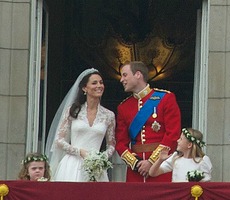There could well be at least 10 babies born today at St Mary’s Hospital in London, of which one boy or girl born will be a future king or queen, writes Sunder Katwala.
They will be among around 373 babies born in London today, and perhaps 2,268 babies born across the UK. These babies born on 22 July 2013 also offer a snapshot of the Britain that the young prince or princess will grow up with.

On a typical day, 100 babies are born in Wales, 165 in Scotland, 71 in Northern Ireland and 1,932 in England.
About 1,074 babies in England and Wales will be born to parents who are married, and about 960 to mothers who are not married. About 580 British-born babies will be born to mothers who were themselves born outside the UK.
These figures are estimates produced by the thinktank British Future, using official 2011 data for births across the UK. In that year, 380,944 boys and 359,771 girls were born in England and Wales, with a further 58,590 babies in Scotland and 25,271 in Northern Ireland, according to the data collected by the Office of National Statistics, the General Register Office of Scotland and Northern Ireland Statistics and Research Agency.
Our estimates simply report the number of babies who would be born in the event that 1/365th of the babies per year were born on a single day. The precise numbers on any actual day will, of course, fluctuate around these statistical averages.
St Mary’s Hospital itself delivers around 4,000 babies a year, or approximately 77 each week, according to information given by the hospital to British Future.
The babies born today could offer both academics and the media a chance to capture the story of how a changing Britain grows up. Michael Apted’s innovative Granada documentary television series 7-Up did so from the 1960s onwards, seeking to capture a range of experiences in a society that saw itself as divided primarily by social class. The participants now seem a narrower selection of today’s Britain than they might have seemed when they were selected. It would be interesting to see whether media organisations retain a similar scope of ambition today. If they do, capturing the story of this royal birth cohort could be an excellent way to capture the story of how Britain changes in the years ahead.
The babies of 2013 will also demonstrate the growing ethnic diversity of British society today. Data is not collected directly on the ethnicity of babies at birth, nor the faith backgrounds or beliefs of their parents. The 2011 census reports almost 3.5 million children aged 0-4: of these 2,684,720 were white, around 77% of the under 4s, compared to 86% of the resident population as a whole.
Census analysis also shows that minority groups in the population have a considerably younger age profile than the white British population, though with the white Irish population having the oldest age profile of all. As the University of Manchester’s census briefing on age and ethnicity sets out, the growth of ethnic minority groups between 2001 and 2011 census was driven more by births and past waves of immigration than by further immigration over the last decade, though both factors contributed. Whatever future choices we decide to make about immigration policy, the multi-ethnic nature of British society has clearly become a settled fact.
Will this changing Britain retain a monarchy by the time the young prince or princess would come to the throne? We will have to wait and see, since that moment is quite probably 60 years away.
The royal baby will be third in line to the throne after Prince Charles and William. Prince William will hope to celebrate his own 90th birthday in 2072, when today’s royal baby would be 59 years old.

Britain has changed a great deal in the last six decades, since the current Queen’s coronation in 1953. What is also striking is how stable attitudes towards the monarchy have been across that period.
Support for a republic was 18% in the first national opinion poll on the subject, in 1969, and has remained extraordinarily steady at almost precisely that level ever since. Pro-republic sentiment did briefly peak at 22% in 2005, and dip to a record low of 13% during the 2012 Jubilee, but it has very consistently been at just below one in five across the decades. At some point in the years ahead, how far this support has depended on the long reign of Queen Elizabeth II will be tested.
For the royal baby to become king or queen, strong support for a constitutional monarchy will have to be maintained in the future too, since monarchies clearly cannot survive in democratic societies without sustained consent.
In the 20th century the constitutional monarchies which were able to survive, as others fell, were those able to successfully adapt to the rise of political democracy, ensuring that they could maintain an appeal across social classes and across the democratic political spectrum. The challenge for constitutional monarchies in the 21st century will be to demonstrate the ability to provide a source of cohesion and shared identity, what Michael Young called ‘national communion‘ in a multi-ethnic and multi-faith society.
The stability of attitudes so far shows that Britain’s increased diversity has done nothing at all to affect popular views of the monarchy. This, in part, reflects the strength of British national identity among ethnic minorities, and how often new Britons are keen to share and celebrate British traditions, as was shown during last year’s Jubilee, including by the refugee Britons who spoke to us about their pride and gratitude towards their new country at a street party in Brixton.
When societies are changing fast, sources of tradition and continuity may be valued more rather than less, particularly if they can become popular symbols for new and old Britons alike of the society that we share.
Sunder Katwala is the director of British Future.






